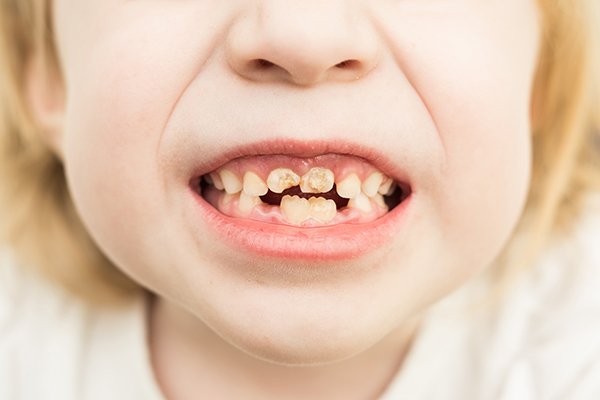Most parents strive to raise health-savvy kids, and teaching good oral and dental health is definitely part of that. What parents may not realize, however, is that good oral health doesn’t just start when a child has a mouth full of teeth.
Baby bottle tooth decay can happen when babies are allowed to drink from a bottle for a prolonged period of time. This most commonly occurs when babies are given bottles just before naptime or bedtime, and they eventually fall asleep with the bottle still in their mouths. The baby’s teeth and gums are the exposed to the liquids in the bottle for hours, which can ultimately lead to premature tooth decay—especially if the bottle was filled with juice or another sugary liquid.
Now, you might be wondering, If my child’s baby teeth are going to fall out, what’s the big deal?
Well, here’s the problem with that logic: Your child’s baby teeth play a vital role in the development of proper eating, speaking, and breathing during your child’s developmental years. If her or she experiences baby bottle tooth decay and it causes them pain, your child may grow fearful of chewing or any other normal function that involves their mouth. This could, in turn, cause significant damage in facial development that may be difficult to reverse and may continue to cause issues in the future.
Additionally, dentists don’t treat tooth decay in babies the same way they do in adults. Babies don’t get fillings; in fact, dentists frequently have to ignore tooth decay in babies depending on how old the child is and how soon he will be getting his adult teeth.
Or, in a worst-case scenario, a dentist may have to remove decayed baby teeth early, which can cause the child a lot of pain and impact the future growth of the adult teeth if the remaining baby teeth shift position in the mouth.
Causes of Baby Bottle Tooth Decay
As I mentioned, baby bottle tooth decay is generally caused when babies have sugary substances in their mouth for a prolonged period of time, but I want to take a closer look at the factors that contribute to this condition.
First, I want to clear up any misconceptions around which drinks are “sugary.” The truth is, nearly any liquid you give your baby other than water is going to contain some sugar, and even natural sugars can contribute to baby bottle tooth decay. Some of the offending drinks include:
- Breast milk
- Milk
- Formula
- Juice
Another factor that can increase the risk for baby bottle tooth decay is the shape of the bottle. If the bottle is designed to push the liquid to the back of the baby’s mouth, bypassing the tongue, normal saliva production is inhibited. This is important because the role of saliva is to protect the teeth from substances that cause buildup of biofilm—the fuzzy substance you feel on your teeth after you’ve eaten certain foods (namely processed carbohydrates and high-sugar foods). Biofilm is created by colonies of bacteria that secrete acid and eat away at your enamel, ultimately causing cavities.
Certainly, teething babies are producing excess saliva that could be protective and prevent biofilm buildup, but it’s important to note that any time your baby is left to drink out of a bottle for an extended period of time, the teeth and gums are given plenty of access to bacteria and their corrosive effects.
Get Dr. B’s Dental Health Tips
Free weekly dental health advice in your inbox, plus 10 Insider Secrets to Dental Care as a free download when you sign up

Signs of Baby Bottle Tooth Decay
So how can you tell if your child is beginning to develop baby bottle tooth decay?
When your child is very young and unable to communicate effectively, it can be difficult to spot tooth decay before the most obvious visual signs are apparent. With that in mind, it’s important to be aware of some of the early signs, including:
- White spots on the teeth
- Visible biofilm around the gums
- Yellow or brown spots on the teeth
- Tooth pain that doesn’t appear to be due to eruption or teething
- Gum pain that doesn’t appear to be due to eruption or teething
Here are some images of baby bottle tooth decay to give you a better idea of what to look for:



If your child appears to have early tooth decay, you should absolutely make a dental appointment, even if it will be your child’s first time seeing the dentist.
How to Prevent Baby Bottle Tooth Decay
Once tooth decay sets in, it’s incredibly hard to reverse in children. Prevention is truly the best course of solution.
The best way to prevent baby bottle tooth decay is to reduce the amount of time between when your baby has had a bottle and when their teeth have been either wiped, rinsed, or brushed.
If your baby is very young and you still want to allow her to have a bottle before bed to help soothe her to sleep, I think that’s totally fine. But you should implement one of the following options:
- Have a wet washcloth on hand, and after she’s finished her bottle, gently massage her teeth and gums to prevent bacteria buildup.
- Another option would be to have a bottle of water on standby for when baby finishes her bottle of milk. Swap the bottles out so the last thing she drinks is water, which will help rinse the gums and teeth.
This same advice can be used for right after breastfeeding. Breast milk contains sugar and this should be taken into consideration once your baby has exposed teeth. Simply wiping the teeth and gums with a gentle washcloth can go a long way in preventing tooth decay in children.
It’s important to teach your child good oral health care habits from an early age. As your baby gets older and has more teeth erupt, you should also begin gently brushing any new teeth as they erupt with a soft kids’ toothbrush.
Most conventional toothpaste are packed with all sorts of unnecessary and harmful ingredients, so I recommend using an all-natural, fluoride-free toothpaste. In fact, if you only have conventional toothpaste on hand, it’s best to just brush with water and not use any toothpaste at all.
Can Baby Bottle Tooth Decay be Treated?
Teeth do have an innate ability to reverse cavities naturally, called remineralization. However, this process is largely dependent upon fat soluble vitamins and minerals such as magnesium, so if your child is not getting the vitamins needed for remineralization in sufficient quantities, this process will be less effective. More importantly, the ability of your baby’s teeth to halt and reverse any decay will be impacted by further exposure to bacteria. As I mentioned in the previous section, the best solution is the prevention of biofilm buildup resulting from overexposure to sugary liquids.
I want to also emphasize the importance of taking your child to the dentist if you feel that any decay has already started to set in.
Baby Bottle Tooth Decay is Completely Preventable
You know the importance of brushing your teeth before you go to bed because, if you don’t you essentially give harmful bacteria eight or more hours to grow and flourish on your teeth. Well, the same is true for your baby when she is allowed to fall asleep with a bottle full of milk, formula, or juice.
But I want to reassure you—the threat of baby bottle tooth decay doesn’t mean you should stop giving your baby bottles before bed completely. I don’t want you to feel that you have to eliminate a very soothing and pleasant experience for your baby. Simply implement the techniques above to reduce the amount of time that sugary substances stay on your baby’s teeth, and you likely won’t run into too many problems.
Dr. Mark Burhenne
Are you worried that your baby is showing signs of baby bottle tooth decay? Tell me about it in the comments below!
Losing Baby Teeth: Are Red Spots On The Gums Normal?
 How to Get Rid of a Cold Sore: Home Remedies, Medications & More
How to Get Rid of a Cold Sore: Home Remedies, Medications & More